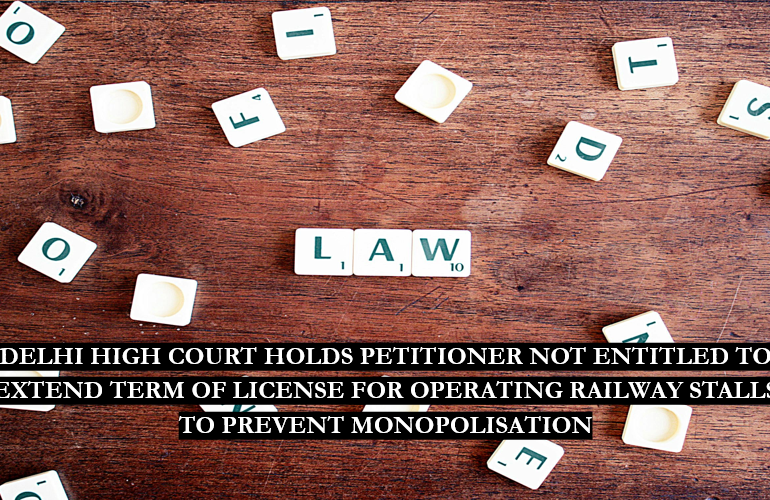DELHI HIGH COURT HOLDS PETITIONER NOT ENTITLED TO EXTEND TERM OF LICENSE FOR OPERATING RAILWAY STALLS TO PREVENT MONOPOLISATION
INTRODUCTION
A Single Judge Bench of the Delhi High Court comprising of Justice Sachin Datta passed an Order dated 29.05.2024 in W.P.(C) 2501/2023, CM APPL. 9571/2023 and 40 Ors. in Urmila Devi & ORS. Vs. Union of India & Ors. and held that as per the terms of the Master License Agreement, upon expiry of the said license for operating multi-purpose stalls in various railway stations, the Petitioner could no longer claim an extension of the term of the Agreement citing COVID-19 Pandemic, as the Railway Board’s 2017 Policy aimed at preventing monopolization and ensuring equal opportunity.
FACTS
i) The Petitioners were operators of miscellaneous stalls and trolleys at various railway stations. Their licenses were governed by the Commercial Circular No. 96 of 2007. However, in 2017, the Railway Board introduced the 2017 Policy through Commercial Circular No. 61, which required the conversion of these miscellaneous stalls/trolleys into Multipurpose Stall (MPS) units. The Policy set a five-year tenure for MPS licenses without the possibility of renewal.
ii) Consequently, Master License Agreements were executed between the Petitioners and the Northern Railway, Respondent No. 2. For instance, Petitioner No. 1, Urmila Devi, operated three MPS units at Bareilly Railway Station; Petitioner No. 2, Nazir Hussain, operated one MPS unit at Moradabad Railway Station; and Petitioner No. 3, M/s Khanchand & Sons, operated one MPS unit at Haridwar Railway Station. These Agreements specified a five-year tenure for the licenses, with no provision for renewal.
iii) However, because of a force majeure event, i.e. COVID-19 lockdown, vide Letter dated 14.12.2022, sent by the Respondent No. 2, the said tenure was extended by 68 days i.e., till 27.02.2023.
iv) The Petitioners contended that the extension was insufficient and sought a proportionate extension based on the reduced license fees during the Pandemic.
v) The Petitioners further contended that the Clauses 5 and 11 of the 2017 Policy were arbitrary and unconstitutional. The Clauses 5 and 11 of 2017 Policy are reproduced below:
“5. Tenure
Allotment of all MPS shall be made for a period of only 5 years at all categories of stations subject to fulfillment of mutually agreed terms & conditions. There shall be no extension and renewal of the MPS units. However, the licensee can participate in the fresh bid, if otherwise eligible.”
“11 Applicability of this policy on the existing stalls.
11.1 No new allotment, renewal, extension of the Bookstall/table (other than philanthropic), Misc. Stalls/ trolley, Chemist Stalls/corner etc. shall be done by the railways as of now. All such existing stalls/trolley etc. shall be allowed for conversion into MPS as the provisions of this policy. However, in case they do not opt for conversion into MPS, the same may be allowed to continue till expiry of the existing agreement/arrangement in vogue.
11.2 After expiry of the current agreement period, space shall be standardized, identified and allotted by Zonal Railways for new MPS as per the extant procedure.
11.3 The existing Bookstall/table (other than philanthropic), Misc. Stalls/trolley, Chemist Stalls/corner etc. shall be given an option to convert the MPS subject to payment of License Fee as quoted by the prospective bidder for similarly placed MPS unit at the station/platform. The tenure of 5 years shall commence from the date of conversion of existing into MPS.
11.4 The one-time division-wise exercise of providing option of conversion to existing licensees and conversion of existing stalls into MPS shall be completed by the Division within 90 days from the date of issue of this policy.
11.5 This Multi Purpose Stall policy will be applicable with immediate effect i.e. from the date of issue. This policy supersedes Misc. Article Policy 2012, Chemist Stall Policy 2000 & 2008 and Bookstall Policies of 2004 and their related instructions, unless specifically referred to in this policy document.”
vi) The Petitioners argued that they were coerced to sign the Master License Agreement with the Respondent No. 2 and that their licenses should be renewed.
vii) The Respondent No.2 argued that the Petitioners had voluntarily agreed to the conversion and benefited from the 2017 Policy. They emphasized that the Policy was designed to ensure equal opportunity and prevent monopolization. The Respondent No. 2 highlighted that the Policy clearly stated that there would be no renewal or extension of the MPS units, and the Petitioners could participate in fresh bids if eligible.
HIGH COURT ANALYSIS AND ORDER
The Court after going through all the facts and circumstances of the case held that that the 2017 Policy was non-arbitrary and aimed at preventing monopolization and ensuring equal opportunity. Furthermore, the Court found that the extension granted due to COVID-19 was reasonable and based on ground realities at various stations thereby, dismissing the Petitioners’ claim for a longer extension as it lacked merit. However, since the Petitioners had been operating the concerned multi-purpose stall for a very long period of time, to enable the Petitioners to make a transition and make alternative vending arrangement/s, the Court considered it appropriate to grant a period of 3 months to the Petitioners to vacate the stalls from the date of expiry of the Agreement or from the date of this Order dated 25.05.2024 whichever is earlier. It was also held that since the Master License Agreement had an Arbitration Clause and if the Petitioners were aggrieved on accounts of insufficiency of extension on account of COVID-19 situation or if they wished to claim damages on any account, they were at liberty to invoke the Arbitration Clause and initiate the proceedings. Hence the Petition was dismissed.
Kartik Khandekar
Senior Legal Associate
The Indian Lawyer & Allied Services





































Leave a Reply